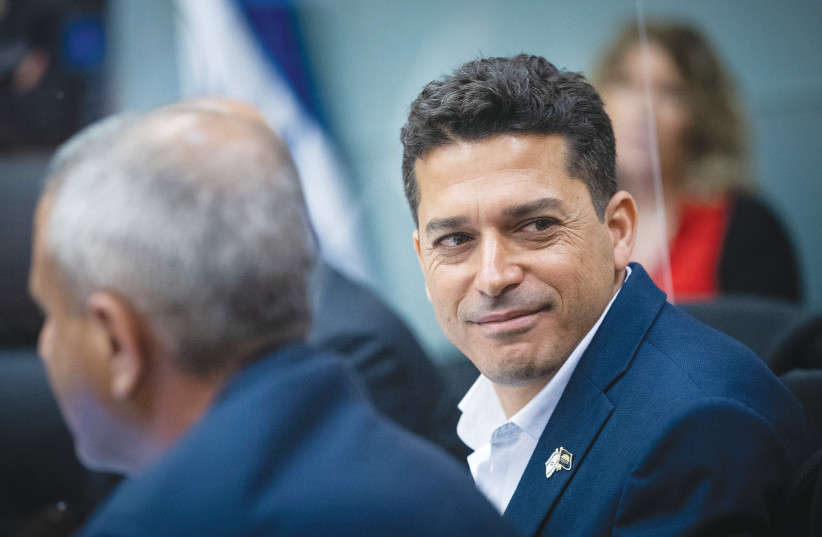When new Diaspora Affairs Minister Amichai Chikli makes his debut in America in the coming days for the Israeli American Council Summit, the American Jews he meets should use the opportunity to request an official voice in his ministry on matters related to antisemitism. This follows Chikli’s first official ministerial act, extending his office to the Diaspora Affairs and Combat Antisemitism Ministry.
In the hierarchy of current concerns, the ministry’s largely ignored name change is quite low. This doesn’t make the stakes any less high. Antisemitism is an issue that almost exclusively impacts Jewish people outside of Israel. As the 2021 Israel-Gaza conflict showed, Israel’s actions are directly linked to increased attacks against Jews around the world.
For the Israeli government to latch on to antisemitism in this political and social climate without the organized input of those whom it impacts the most could have devastating consequences – both in the face of world Jewry’s strategic antisemitism efforts as well as Israel-world Jewry relations. It breaches the spirit of the 1949 informal “Blaustein-Ben-Gurion Agreement,” in which Israel’s first prime minister agreed neither to claim to represent, nor interfere, in American Jewry’s affairs.
For these reasons and more, the Israeli government requires direct consultation from world Jewry.

The Israeli government needs direct consultation from world Jewry
It is not to be assumed that Israel and the global Jewish community diagnose “the fight” similarly or prescribe matching rhetoric or response. Antisemitism is a growing and complex beast, which emerges from a number of distinct phenomena; it manifests within different races, religions, ethnicities and nations in parallel and intersecting forms. Global Jewry has a critical role in clarifying the challenges and prescribing solutions in partnership with the Israeli government.
But the real value of nurturing formal dialogue today actually lies in the relationship between the Jewish people and the State of Israel tomorrow. We’ve arrived at a critical moment in which a broad sector of world Jewry finds themselves at a crossroads with the Jewish state. Sadly, following years of disappointments, Israel has become more of a drain than a fountain, and internal struggles – in which antisemitism dominates – leave energy for little else.
Political economist Albert Hirschman’s Exit, Voice and Loyalty model best illustrates the point. In any transactional system – say, between a nation-state and its diaspora, when the “user” takes issue with the authority figure, they have three options: to exit, i.e., opt out of the relationship; give voice to their concern with the expectation of being heard, or be a loyal but stagnant member.
A crucial sector of world Jewry will exit if they are not heard.
AN OFFICIAL mechanism established to harness the various interests of the Jewish world will productively contribute to safeguarding the Jewish people and be an initial step in providing world Jewry with a critical voice in Israel.
There’s precedent. Former Diaspora minister Omer Yankelevitch conducted a comprehensive process with hundreds of Jewish players around the world, exploring how the Israeli government should consult with world Jewry. Nearly full consensus was reached on the idea that the Israeli government must consult with world Jewry when acting on antisemitism.
In a separate process, the former minister consulted with global Jewish leaders on how to collectively mark modern antisemitism. Before intervening in governments’ policies against kosher slaughter or other Jewish ritual matters, the ministry consults with Jewish community professionals on how to respond in order to best serve the community’s needs.
There also were ongoing talks in recent years between the Diaspora Affairs Ministry and relevant players to develop an understanding of the government’s unique role and responsibility surrounding global Jewish safety and resilience.
Perhaps most appealing, developing a consultation mechanism between Jewish leadership and the Israeli government on antisemitism sets the foundation for broader dialogue and conflict-transformation efforts. This model could be utilized with future governments to solve other pressing Jewish conflicts – from “Who is a Jew” to the issues surrounding the Western Wall. At a baseline, giving world Jewry a voice – even on select matters – minimizes the explosive potential of current and future crises.
Moments of confusion, discontent and “non-traditional” authority can bring about remarkable progress. It is no coincidence that the Abraham Accords materialized during the chaos of the Trump-COVID-19 era. Take a moment to imagine what the “Antisemitism Accords” between world Jewry and Israel might look like at this moment and what they could ultimately bring about in the long run of Israel-Diaspora relations.
The writer is the director of the Tisch Center for Jewish Dialogue at the ANU Museum. She is a former adviser to two Diaspora affairs ministers.
